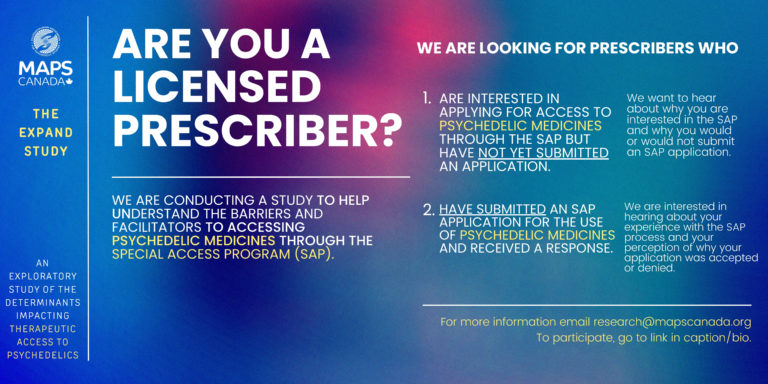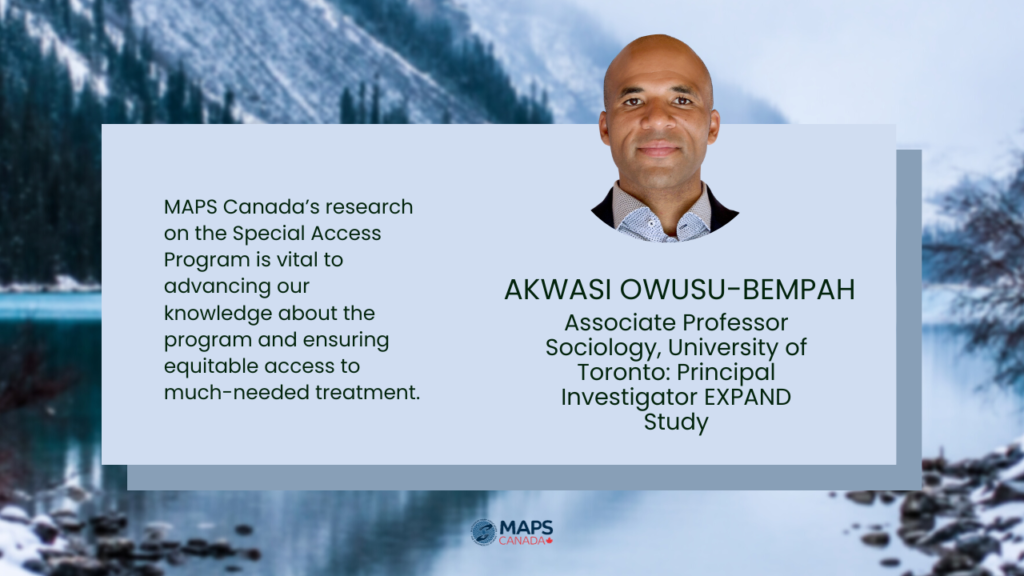MAPS Canada’s research initiatives aim to support Canadian psychedelic science and researchers.
Our Research Committee leads our efforts to support multidisciplinary psychedelic research in Canada, including raising funds for the MAPS Canada Research Grant, to support Canadian clinical trials on psychedelic-assisted therapies and other psychedelic-related research. We also conduct our own studies! Read more below.
MAPS Canada works to educate the public on important research taking place in Canada and around the world. Our goal is to present factual, balanced, evidence-based information about psychedelic science. Check out our Research Room , Webinars, and School of Psychedelics.
OUR STUDIES
The EXPAND Study

MAPS Canada launched our first research study in 2023, Examining the Special Access Program (SAP) for Therapeutic Access to Psychedelics in Canada Nationally – An Exploratory Study of the Determinants Impacting Access (The EXPAND Study).
About the EXPAND Study
Canada is one of the only countries with routes for legal access to psychedelics at the national level. Most psychedelics in Canada are federally scheduled and unavailable for sale for medical use. In 2022, psychedelics became accessible through the Special Access Program (SAP). The SAP considers requests for access to drugs that are unavailable for sale in Canada for treatment of patients with serious or life-threatening conditions when conventional treatments have failed or are unsuitable. Applications to the SAP must be submitted by licensed prescribers, and are evaluated on a case-by-case basis. Information about SAP applications for psychedelics is not publicly available.
MAPS Canada designed an REB-approved, mixed-methods survey study to assess how factors related to patient characteristics, prescriber knowledge, professional background, and policy landscape influenced prescribers’ decisions to submit SAP applications for psychedelics.
Participants: Canadian prescribers who were interested in making an SAP application but had not yet done so, and those who had already made an SAP application for access to psychedelics.
Research Question: How do medical and social factors impact prescribers’ perceptions of the therapeutic use of psychedelics and access through the SAP?
Survey Development: Prior to distribution, the survey was pilot-tested by members of a physician community of practice. The survey was created on RedCap and distributed online and included both closed-ended and open-ended questions.
Participants were recruited through direct outreach to physicians, nonprofit groups, and patient advocates, and targeted marketing. Data was collected via online survey using RedCap software, using a combination of likert scales and open-ended questions.
Status Update: The survey is now closed and data analysis is underway. the

For more information about the EXPAND study, contact us at
To learn more about MAPS Canada’s Psychedelic Access Community of Practice, click here.
